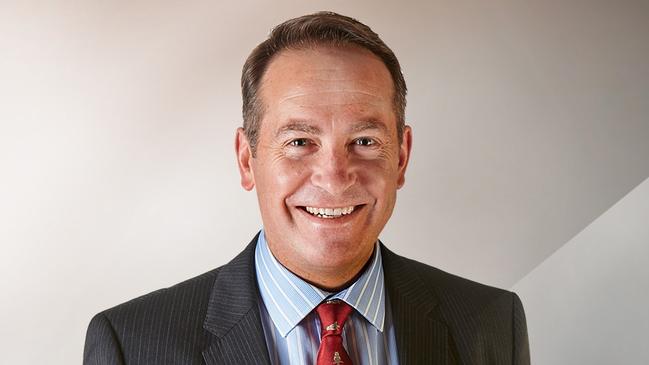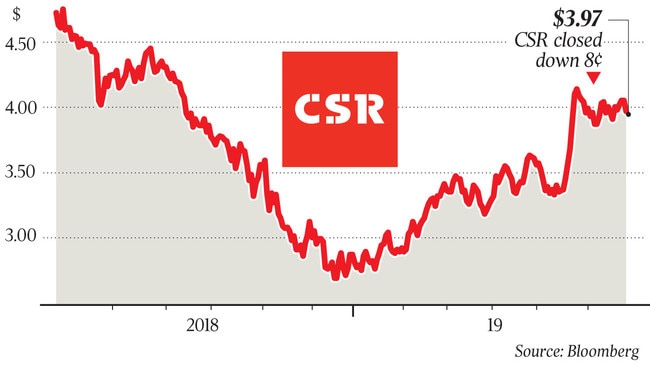CSR calls for urgent action on gas price
CSR chairman John Gillam has added to pressure on the federal government to act swiftly to bring down east coast energy prices.

CSR chairman John Gillam has added to pressure on the federal government to act swiftly to bring down east coast energy prices, telling shareholders major manufacturers will be pushed offshore if action is not taken.
Mr Gillam warned the company’s annual shareholder meeting yesterday that energy prices were one of the “key operational issues” facing the building and manufacturing giant, and he called on state and federal governments to open up Australia to fresh onshore gas exploration and flagged a renewed push for regulators to pay major energy users to cut energy use at peak periods next summer.
“Gas consumers in Australia now pay as much for gas as our Asian neighbours who have no local gas reserves,” he said. “This market inequity greatly hinders all parts of manufacturing. State and federal governments should be accessing the significant gas reserves in NSW and Victoria that do not require extensive investment in pipeline networks.”
Mr Gillam also flagged a fresh push from major energy users for the introduction of demand-side management in the National Energy Market, telling shareholders Newcastle’s Tomago aluminium smelter — in which CSR has a 25 per cent stake — could play a major role in helping stabilise the NSW power grid it if was allowed to.
Tomago is among NSW’s biggest power users, making up about 12 per cent of the state’s electricity consumption on any given day, and CSR — along with other major power users — have been pushing for changes to market rules to allow the Australian Energy Market Operator to ask them to take their facilities off line, in exchange for cash payments, when demand peaks in the summer months.

CSR managing director Rob Sindel was one of the signatories, along with BlueScope steel boss John Nowlan, on an open letter to the energy market rule-setter this week calling for the introduction of the reforms.
Tomago’s contract with AGL Energy, which supplies power to the smelter, already includes load-shedding clauses callable by AGL, but CSR and other major energy users have been pushing for new rules that allow them to sell load-shedding capacity direct to the market through AEMO, rather than through retailers.
Mr Gillam did not refer to the push directly in his speech but said Tomago’s energy positioned it as a major player in the NSW grid.
“Tomago is uniquely placed to play a key role in the reliability of electricity supply for the benefit of all energy consumers in NSW,” he said. “This will require agreement across electricity users, generators and governments to settle on practices which better utilise our existing power supplies while ensuring we support manufacturing industries.”
Mr Sindel’s open letter to the Australian Energy Market Commission, which sets the market rules implemented by AEMO, called for energy users that shed load to be paid rates “on an equal footing with generation in the wholesale market”, meaning Tomago could receive payments around the market cap of $14,500 per megawatt hour if it sheds use as demand peaks next summer.
Alcoa’s Portland Aluminium smelter in Victoria was forced to shut down without payment in January as temperatures peaked, putting pressure on the Victorian and South Australian grid, dropping about 400MW of capacity to avoid power cuts elsewhere across the two states.
The entry of Tomago and other major energy users into the market through demand-side agreements dispatchable by AEMO is likely to raise eyebrows at power retailers, particularly AGL, which recently submitted environmental approval documents for a proposed $400 million gas-peaking plant near the aluminium smelter.
The 250MW plant would open in 2022, around the time its Liddell coal-fired plant is due to close, and supply electricity to the market only at times of peak demand.
Mr Gillam told shareholders that energy market reform should be a key policy focus of Australian governments if the country was to keep key manufacturing industries operating.
“CSR first invested in Tomago back in the early 1980s as it was able to access Australia’s plentiful and low-cost energy resources,” he said. “Today, while Australia continues to have a natural competitive advantage with access to widespread electricity — either through fossil fuels or renewable sources — we are paying some of the highest prices for energy in the world.
“This is not sustainable for many manufacturers which compete on the global market. Our policies must address the key points of energy reliability and affordability alongside the impact of carbon emissions and climate change.”

